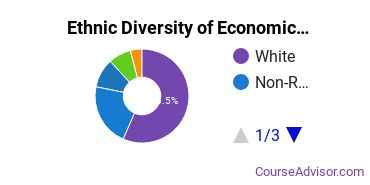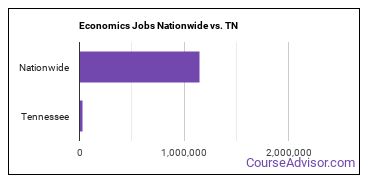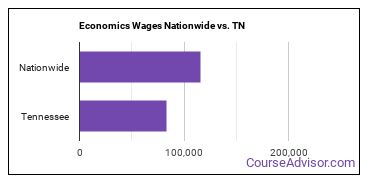Economics Schools in Tennessee
501 Economics students earned their degrees in the state in 2022-2023.
An Economics major is the 37th most popular major in this state.
Education Levels of Economics Majors in Tennessee
Economics majors in the state tend to have the following degree levels:
| Education Level | Number of Grads |
|---|---|
| Bachelor’s Degree | 427 |
| Master’s Degree | 57 |
| Doctor’s Degree (Research / Scholarship) | 17 |
| Doctor’s Degree (Professional Practice) | 17 |
| Doctor’s Degree (Other) | 17 |
Gender Distribution
In Tennessee, a economics major is more popular with men than with women.

Racial Distribution
The racial distribution of economics majors in Tennessee is as follows:
- Asian: 10.2%
- Black or African American: 3.6%
- Hispanic or Latino: 7.2%
- White: 48.7%
- Non-Resident Alien: 23.6%
- Other Races: 6.8%

Jobs for Economics Grads in Tennessee
In this state, there are 23,940 people employed in jobs related to an economics degree, compared to 1,144,130 nationwide.

Wages for Economics Jobs in Tennessee
Economics grads earn an average of $83,010 in the state and $115,590 nationwide.

Most Popular Economics Programs in TN
There are 10 colleges in Tennessee that offer economics degrees. Learn about the most popular 10 below:
The full-time teacher rate is 82%. An average student at Vanderbilt will pay a net price of $20,917. The student to faculty ratio is 7 to 1.
Request Information18 to 1 is the student to faculty ratio. A typical student attending UT Knoxville will pay a net price of $19,400. Seeking financial aid? At this school, 91% of students receive it.
Request Information98% of students are awarded financial aid at this school. The full-time teacher rate is 88%. An average student at Sewanee will pay a net price of $26,357.
Request Information98% of students are awarded financial aid at this school. The full-time teacher rate is 82%. This private institution charges an average net price of $26,604.
Request InformationA typical student attending UofM will pay a net price of $13,216. The full-time teacher rate is 71%. It takes the average student 4.57 years to graduate.
Request InformationThis public college charges it's students an average net price of $13,267. The student to faculty ratio is 16 to 1. The full-time teacher rate is 81%.
Request InformationThe student to faculty ratio is 16 to 1. It takes the average student 4.49 years to graduate. The full-time teacher rate is 68%.
Request InformationSeeking financial aid? At this school, 97% of students receive it. This public college charges it's students an average net price of $14,426. Of all the teachers who work at the school, 74% are considered full time.
Request InformationAn average student at Maryville College will pay a net price of $21,293. 12 to 1 is the student to faculty ratio. Seeking financial aid? At this school, 100% of students receive it.
Request InformationThe student to faculty ratio is 9 to 1. The average student takes 4.12 years to complete their degree at Milligan. Students who attend this private institution pay an average net price of $19,981.
Request InformationEconomics Careers in TN
Some of the careers economics majors go into include:
| Job Title | TN Job Growth | TN Median Salary |
|---|---|---|
| Market Research Analysts and Marketing Specialists | 35% | $55,780 |
Related Majors in Tennessee
Below are some popular majors in the state that are similar to economics.
| Major | Annual Graduates in TN |
|---|---|
| Political Science & Government | 718 |
| Sociology | 428 |
| General Social Sciences | 269 |
| Anthropology | 154 |
| International Relations & Security | 109 |
| Geography & Cartography | 38 |
| Urban Studies | 21 |
| Other Social Sciences | 21 |
View all majors related to Economics
Explore Major by State
Alabama
Arkansas
Connecticut
Florida
Idaho
Iowa
Louisiana
Massachusetts
Mississippi
Nebraska
New Jersey
North Carolina
Oklahoma
Rhode Island
Tennessee
Vermont
West Virginia
View Nationwide Economics Report
References
- College Factual
- National Center for Education Statistics
- O*NET Online
- Image Credit: By pixabay under License
More about our data sources and methodologies.









